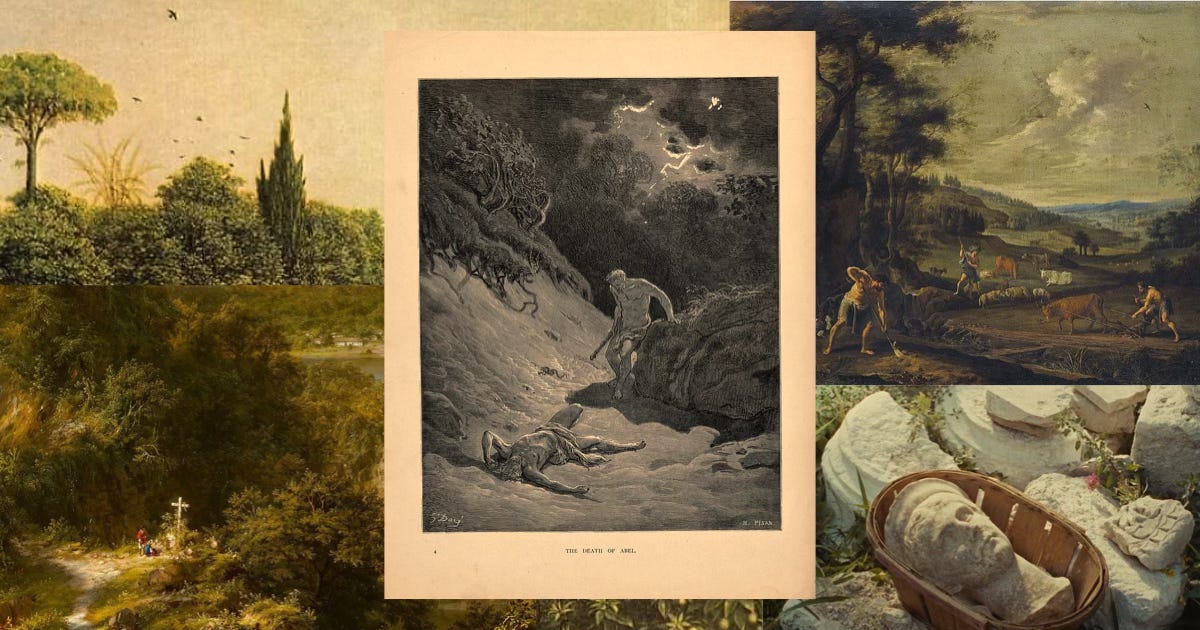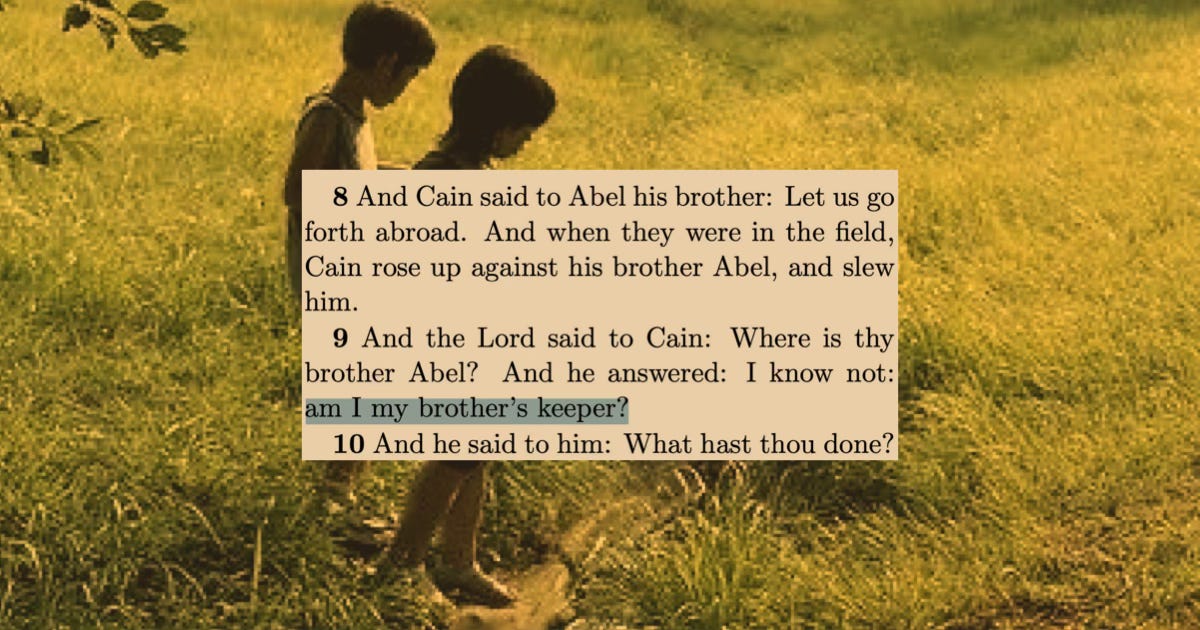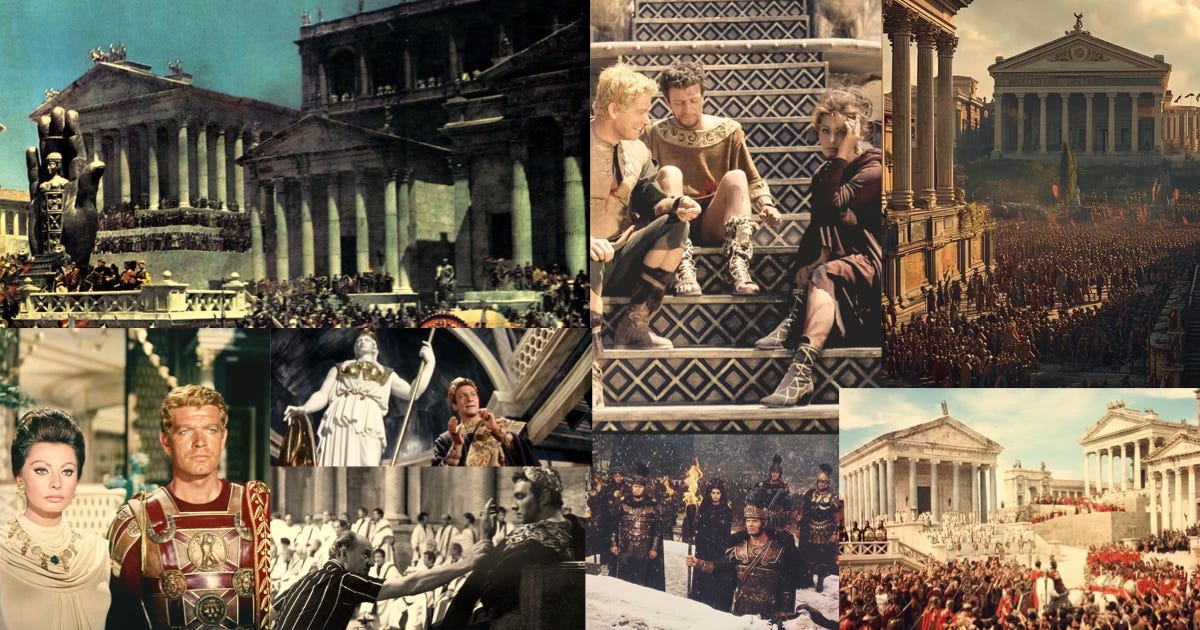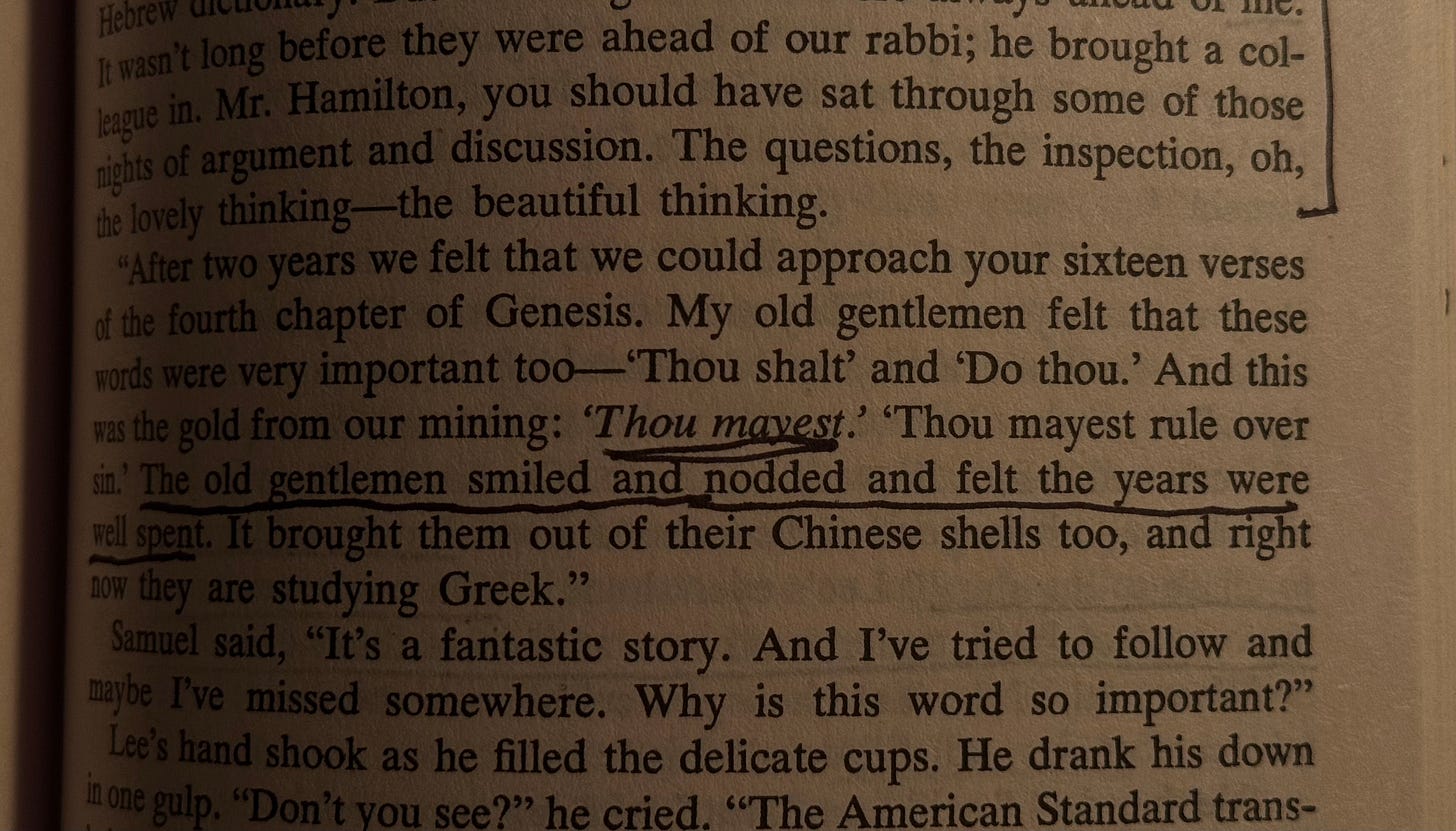“The story of Cain and Abel is in fact the only story we have. Every story is the same: the good and the bad, the hero and the villain, the one who is favored and the one who is not, the one who kills and the one who is killed.” -John Steinbeck, East of Eden
Ever since I’ve read this line I can’t stop thinking of it.
Recently I’ve been thinking a lot about how jealousy might be the worst vice, the one that destroys everything, all chance of love or connection— and that’s what the Cain & Abel story is, really, someone who was so jealous of his brother that it drove him to murder.
And then once I read this line, I couldn’t stop seeing it everywhere— weaved into every story of my life, in every movie and show, in the stories of my friends, on social media—
And it’s the vice that seems to be the most belittled, renamed as “comparison”, shifting the blame to the object of envy, as if that person shouldn’t have so much to begin with— shouldn’t look so good or travel so much, shouldn’t have so many friends or so much love. They’re so privileged, and you, poor thing, have every right to hate them! Murder them in your heart, because if you cannot be as happy as they are, they do not deserve to have it at all. How dare they be happy where others can see them.
And then, on the flip side, whenever a person wrongs someone, other people always say to them, as if it will be some comfort, “don’t worry, they’re probably just jealous of you.”
Don’t worry? Just? It’s the worst thing anyone can be of anyone. It’s really the only thing anyone should be worried about. Jealousy is what drives murder, it’s what ruins the closest of friends, what breaks the tightest bonds.
And yet, many people desire for other people to be jealous of them. Instead of working hard to take joy in their work, some will do anything explicitly to make others jealous of their accomplishments— as Ecclesiastes 4:4 says “and I saw that all toil and all achievement spring from one person’s envy of another. This too is meaningless, a chasing after the wind.” Trying to get people to be jealous of you— it’s like hoping for a target on your back.
And maybe those who resort to being jealous of others or those that desire to be the object of jealousy, do it because they felt that the first could not be loved. If someone feels they can’t be loved, attention looks like a decent alternative.
“Then the Lord said to Cain, ‘Why are you angry? Why is your face downcast?
If you do what is right, will you not be accepted? But if you do not do what is right, sin is crouching at your door; it desires to have you, but you must rule over it.’”
Sin was crouching at Cain’s door. Jealousy’s hand gripped the doorknob.
But Cain hurt from not being accepted— instead of owning that the rejection was deserved, instead of changing his ways to have God’s love as well— he decided to take away Abel’s ability to receive love at all.
“If I cannot be loved, then neither should anyone else.”
And not every Cain is a murderer, not every petty teenage girl glancing sideways at her friend is a killer, but we all know that if we hate, we have already murdered in our hearts.
It desires to have you, but you must rule over it.
The age old story can only be broken if we make the conscious decision to rule over it. To rejoice in the love others receive. To reference Steinbeck again, we need to be like Samuel Hamilton, who “loved a celebration of the human soul. Such things were like a personal triumph to him.”
To take real joy in the accomplishments of others, who are making the world a better place, who are doing the most with what they’ve been given, who are showing us how great we can be.
I watched Supersonic yesterday, a documentary about one of my favorite bands, Oasis. You know, that band with the infamous sibling rivalry, the Gallagher brothers: Liam, the frontman & singer of the band, and Noel, the songwriter and guitarist. Throughout the film, Liam wished he could be as good of a songwriter as Noel, and Noel wished he could have Liam’s ability to carry the band as he did. At the very beginning, Noel started to say “We’re like those brothers from the Bible—” comparing themselves to Cain & Abel- to which through their conversation they said that they loved each other, but at the same time hated each other.
And that’s what split up the band ultimately for as long as they did— their relationship & bond with each other was the beginning and spirit of the band, and the jealousy, the spite— ended it.
Only a few days before this I’d also recently watched The Fall of the Roman Empire (1964) and it’s basically the same story as Gladiator, except even more heart wrenching & much more telling of a Cain & Abel dynamic. Livius is loved by Marcus Aurelius, the emperor, and is chosen to be the next ruler of Rome instead of his own son, Commodus. But what makes this even more interesting than the fight for the throne in Gladiator, is that in this movie Livius & Commodus have grown up together like brothers. They are best of friends. Commodus takes the place of Cain in this story, ultimately turning on Livius to do anything for the throne.
Commodus could not be loved by his father as Livius was, and wanted his rewards, but could not be good like him.
And the age old story, again and again, repeating itself throughout all of history.
But as Steinbeck proposed the idea that Cain & Abel is the story of all humanity, he also brings the solution.
In this section of East of Eden, the two characters Samuel Hamilton & Lee are talking about Cain & Abel’s story— and one word had them hung up. Lee set out to discover the true meaning of the word in the original Hebrew.
“If you do what is right, will you not be accepted? But if you do not do what is right, sin is crouching at your door; it desires to have you, but you must rule over it.’”
The word was must— you *must* rule over it? What did that word actually mean?
They discovered that the most accurate translation from the original text was thou mayest. That Cain, after all he had done, still may have the choice to rule over his sin despite it all.
“For in his weakness and his filth and his murder of his brother he has still the great choice. He can choose his course and fight it through and win.”
Ultimately we are given the choice to beat the Cain & Abel trope and win— to love each other as we were meant to, free from jealousy and rivalry, and to live as we were made to.









In many cultures around the world, the idea of jealousy is spoken of as "the evil eye." In such places as Nicaragua, the wealthy live in houses with dingy exteriors and beautiful interiors. In places where robbery and murder are common, success must be hidden from jealous eyes. On the one hand, jealousy for glory is the root of ambition, and on the other hand, fear of the jealousy of others makes ambition useless, because your toil will be for another.